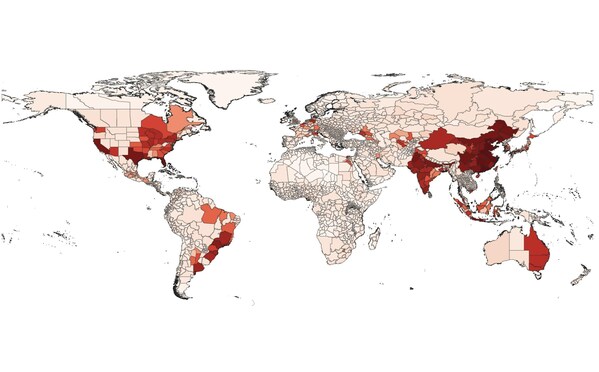World-first analysis of built environment exposes vulnerability of economic centres
LONDON, Feb. 21, 2023 /PRNewswire/ — The engine rooms of the global economy are among states and provinces most at risk from climate change and extreme weather according to a new ranking of the physical climate risk of every state, province and territory in the world released today by XDI (The Cross Dependency Initiative) – a world leader in physical climate risk analysis.
XDI’s Gross Domestic Climate Risk ranks over 2,600 jurisdictions around the world in 2050 according to modelled projections of damage to the built environment from extreme weather and climate change including from flooding, forest fires and sea level rise. It also identifies which of these jurisdictions see the greatest escalation of modelled damage from 1990 to 2050.
The results show that globally-significant states and provinces in China and the United States will be hit hardest, along with major cities and centres of economic activity around the world.
“We’re releasing this analysis in response to demand from investors for data on sub-sovereign and regional risk,” said XDI CEO Rohan Hamden.
“This is the first time there has been a physical climate risk analysis focused exclusively on the built environment, comparing every state, province and territory in the world. Since extensive built infrastructure generally overlaps with high levels of economic activity and capital value it is imperative that the physical risk of climate change is appropriately understood and priced.”
The XDI Gross Domestic Climate Risk comparison of physical climate risk for 2050 found:
- Two of China’s largest sub-national economies – Jiangsu and Shandong – top the global ranking, in first and second place. Over half of the provinces in the global top 50 are in China.
- After China, the US has the most high-risk states with 18 states in the top 100. Florida is the highest-ranking US state, followed by California and Texas.
- Together, China, India and the US make up over half the states and provinces in the top 100.
- Other highly-developed and globally-significant economic hubs in the top 100 include Buenos Aires, São Paolo, Jakarta, Beijing, Hồ Chí Minh City, Taiwan and Mumbai.
- South East Asia experiences the greatest escalation in damage from 1990 to 2050 anywhere in the world.
- Globally, most damage is caused by riverine and surface flooding or flooding combined with coastal inundation.
“The findings from the XDI Gross Domestic Climate Risk ranking underscore the importance of pricing physical climate risk in financial markets, including bond markets, given the amount of capital investment represented by the assets at risk in the provinces identified, the vulnerability of global supply chains, and the need for climate resilience to inform investment,” said Mr Hamden.
“It is crucial for companies, governments and investors to understand the financial and economic implications of physical climate risk and weigh this risk in their decision-making before these costs escalate beyond financial tipping points,” he added.
The full dataset can be accessed on the XDI website.

